Unit1 sectiona 1a-2d
人教版七年级上册英语Unit 1Section A(1a-2d)
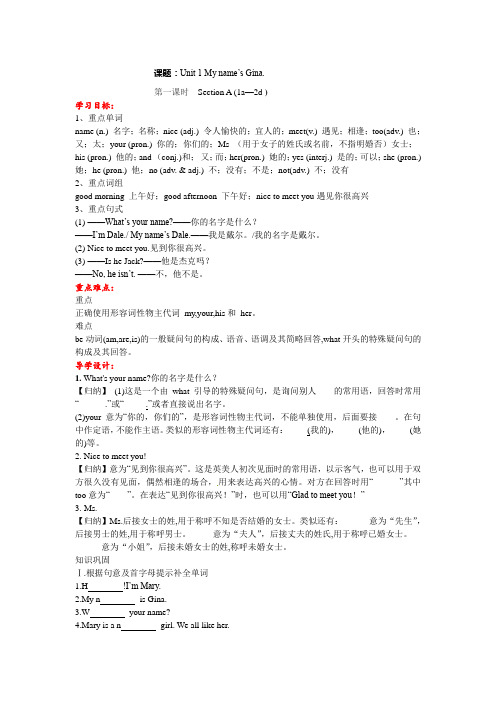
课题:Unit 1 My name’s Gina.第一课时Section A (1a—2d )学习目标:1、重点单词name (n.) 名字;名称;nice (adj.) 令人愉快的;宜人的;meet(v.) 遇见;相逢;too(adv.) 也;又;太;your (pron.) 你的;你们的;Ms (用于女子的姓氏或名前,不指明婚否)女士;his (pron.) 他的;and (conj.)和;又;而;her(pron.) 她的;yes (interj.) 是的;可以;she (pron.) 她;he (pron.) 他;no (adv. & adj.) 不;没有;不是;not(adv.) 不;没有2、重点词组good morning 上午好;good afternoon 下午好;nice to meet you遇见你很高兴3、重点句式(1)——What’s your name?——你的名字是什么?——I’m Dale./ My name’s Dale.——我是戴尔。
/我的名字是戴尔。
(2)Nice to meet you.见到你很高兴。
(3)——Is he Jack?——他是杰克吗?——No, he isn’t. ——不,他不是。
重点难点:重点正确使用形容词性物主代词my,your,his和her。
难点be动词(am,are,is)的一般疑问句的构成、语音、语调及其简略回答,what开头的特殊疑问句的构成及其回答。
导学设计:1. What's your name?你的名字是什么?【归纳】(1)这是一个由what引导的特殊疑问句,是询问别人____的常用语,回答时常用“______.”或“_____.”或者直接说出名字。
(2)your意为“你的,你们的”,是形容词性物主代词,不能单独使用,后面要接____。
在句中作定语,不能作主语。
类似的形容词性物主代词还有:_____(我的),_____(他的),_____(她的)等。
Unit1SectionA1a-2d教案(五四制)英语八年级上册
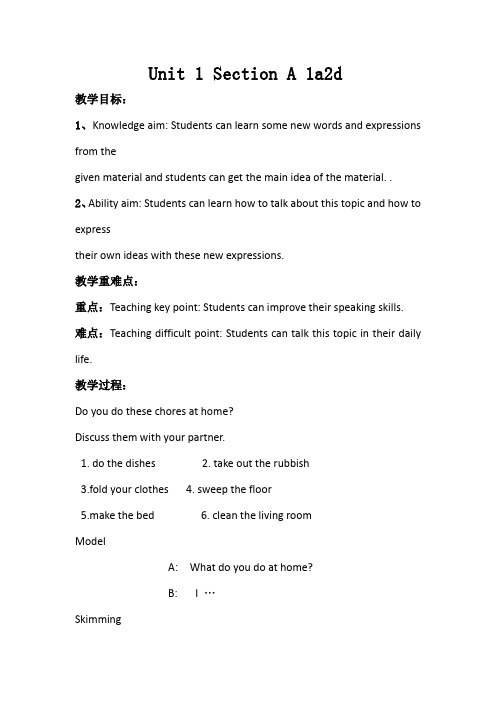
Unit 1 Section A 1a2d教学目标:1、Knowledge aim: Students can learn some new words and expressions from thegiven material and students can get the main idea of the material. .2、Ability aim: Students can learn how to talk about this topic and how to expresstheir own ideas with these new expressions.教学重难点:重点:Teaching key point: Students can improve their speaking skills.难点:Teaching difficult point: Students can talk this topic in their daily life.教学过程:Do you do these chores at home?Discuss them with your partner.1. do the dishes2. take out the rubbish3.fold your clothes4. sweep the floor5.make the bed6. clean the living roomModelA: What do you do at home?B: I …SkimmingThis means looking quickly through a piece of writing to find the main idea without reading every word. It is still a good idea to read the first sentence in each paragraph a little more carefully.They are probably about whether kids should________.A. spend time on schoolworkB. help out with chores at homeC. learn to be independent(独立的)Dear Sir,I do not understand why some parents make their kids help with housework and chores at home. Kids these days already have enough stress from school.They do not have time to study and do housework, too. Housework is a waste of their time. Could we just let them do their job as students? They should spend their time on schoolwork in order to get good grades and get into a good university. Also, when they get older, they will have to do housework so there is no need for them to doit now. It is the parents’job to provide a clean and fortable environment at home for their children. And anyway, I think doing chores is not so difficult. I do not mind doing them.Ms. MillerDear Sir,I think it is important for children to learn how to do chores and helptheir parents with housework. It is not enough to just get good grades at school. Children these days depend on their parents too much. They are always asking, “Could you get this for me?”or “Could you help me with that?”Doing chores helps to develop children's independence and teaches them how to look after themselves. Italso helps them to understand the idea of fairness. Since they live in one house with their parents, they should know that everyone should do their part in keeping it clean and tidy. Our neighbors’son got into a good college but during his first year, he had no idea how to take care of himself. As a result, he often fell ill and his grades dropped. The earlier kids learn to be independent, the better it is for their future.Mr. SmithMake conversations between Peter and his father.Ask for permission礼貌地取得同意A: Could I use your puter?B: Sorry. I'm going to work on it now.A: Well, could I watch TV?B: Yes, you can, but first you have to clean your room.homework.Help your parents do housework..Make a new conversation about housework.DiscussionQ1: Do you help your parents do the chores at home?Q2: Do you ask your parents’permission for?Q3: Do your parents ask you to do some things for them? What do your parents ask you to do?study harddo choresgo to the store/supermarket to buy things for them。
人教版七年级英语上册 Unit 1 SectionA (1a-2d)
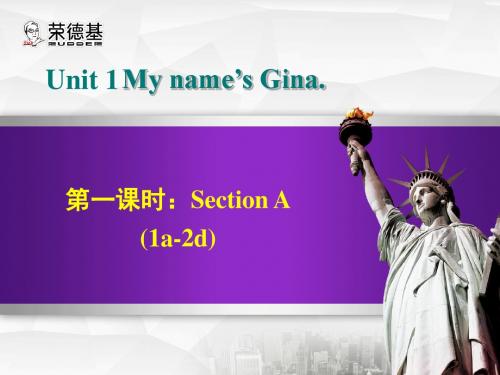
meet you, too.(我也很高兴认识你。)”,注意
too前要加逗号和前面部分隔开。
讲解来自《点拨》
eg:Wang Tao: Liu Li, this is Wang Hao. 王涛:刘丽,这是王浩。
Wang Hao:Nice to meet you.
王浩:很高兴认识你。 Liu Li:Nice to meet you, too. 刘丽:我也很高兴认识你。 拓展 还有下列打招呼的问候语: 初次认识可以说: —Glad to meet you. —Glad to meet you,too.
讲解来自《点拨》
—How do you do? —How do you do?
熟人、朋友之间问候要用:
—Glad/Nice to see you. —Glad/Nice to see you,too.
—How are you?
—I'm fine/Not bad/Very well,thank you. And you? 小孩或年轻人可以比较随便地说: —Hello!/Hi! —Hello!/Hi!
讲解来自《点拨》
典例
—Mom,this is my friend,Nick. —________ (安徽省安庆市十六校联考) C A.Thank you. C.Glad to meet you. B.OK. D.How are you?
【点拨】此题运用交际法。在交际用语中介绍他人
“This is...”,答语可用“Glad to meet you.” 或“Nice to meet you.”
Unit 1 My name’s Gina.
第一课时:Section A
(1a-2d)
第一课时:Section A (1a-2d)
Unit1SectionA1a-2d课件人教版七年级英语下册

e.g. Ms. Brown is good with students. 布朗女士擅于和学生们交往。 Jack is not good with people. 杰克不太擅于与人相处。
Learning objects
Nothing great was ever achieved without enthusiasm
Unit 1 Can you play the guitar
七年级下册英语 Section A 1a-2d
1b Listen and number the conversations
A: Can you swim
He can sing.
Nothing great was ever achieved without enthusiasm
He can swim.
Nothing great was ever achieved without enthusiasm
1b Listen and number the conversations.
Learn to walk before you run
➢ Key words & phrases: ➢ guitar; sing; swim; dance; draw; chess; play chess; speak;
speak English; join; club; play the guitar. be good at; tell; story; tell
2. Then we need you to help with sports… help (sb.) with sth. 在某方面帮助某人
人教版九年级英语上册unit 1 Section A(1a-2d)

5 ____ Have you ever studied with a group?
2b Listen again. Match each answer below with a question above.
d,b,c,a
2c Make conversations using the information in 2a and 2b A: Have you ever studied with a group? B: Yes, I have. I’ve learned a lot that way.
• 4) English is spoken by lots of people. • 5) My brother studies history by working with a group. 表示方式或手段,by + V-ing形式,在句中作方式状语,“通过…… 方式(方法)”或“借助……手段”
Unit 1 How can we become good learners?
Section A
TALK ABOUT HOW TO STUDY
Do you study English by the following ways?
by reading aloud.
by asking the teacher for help.
Summary How do you study English? 1. by working with friends 2. by watching English movies. 3. by making word cards. 4. by reading the textbook. 5. by listening to tapes. 6. by asking the teacher for help. 7. by reading aloud.
人教版八年级上册英语 Unit 1 Section A (1a-2d) 授课课件

是指某些人或物中的“任何一个”,用来表明只限一个
辨析:anyone, anybody与anyone
都指“任何人”,其后一般不接 anybo of,作主语时,谓语动词用第三
dy, 人称单数形式。 anyon 后面不可接动词的否定形式;如
e 果要表达全部否定, 主语用 nobody。 是指某些人或物中的“任何一
.
课文呈现
1c. Makeconversationsaboutthepeopleinthepicture. A:WheredidTinagoonvacation? B:Shewenttothemountains.
课文呈现
People Grace Kevin Julie
Places
Thebeach Home
考点精讲
考点5 quiteafew相当多;不少
修饰可数名词 复数,相当于 many和quite a lot of。
e.g. Quiteafewstudentsgotoschoolbybike.
相当多的学生骑自行车上学。
拓 展 : quitealittle 表 示 “ 相 当 多 ; 不 少 ” , 相 当 于
考点精讲
③Oh, didyougoanywhereinteresting?
考点3 (重点)anywhere/'eniweə/adv. 在任何地方 形容词修饰复合不定代词、不定副词时,位于不定 代词、不定副词的后边。
anywhere常用于否定句和疑问句中,表示“在任何 地方”;如果用在肯定句中,表示“在(或去)任 何地方,随便哪个地方”。
? Grace: Yes. I went with my mother. Boy: Did you go to Central Park? Grace: Yes, I did. It was really nice. Boy: Did you buy anything special? Grace: Yes. I bought something for my f
人教版初中英语八年级上册Unit 1 Section A 1a—2d,(共16张PPT)

1
2
3
4
5
Writing If you are Li Hua , introduce your friends and your vacation in the chart.
Exercise: I.写出下列短语: 1.呆在家___________2.去纽约市__________ 3.去海滩___________4.去夏令营___________ 5.去爬山___________6.拜访我的叔叔_______ 7.参观博物馆________ II.用所给单词的适当形式填空:
13、He who seize the right moment, is the right man.谁把握机遇,谁就心想事成。21.8.2421.8.2422:49:0322:49:03August 24, 2021
•
14、谁要是自己还没有发展培养和教育好,他就不能发展培养和教育别人。2021年8月24日星期二下午10时49分3秒22:49:0321.8.24
•
11、只有让学生不把全部时间都用在学习上,而留下许多自由支配的时间,他才能顺利地学习……(这)是教育过程的逻辑。21.8.2422:49:0322:49Aug-2124-Aug-21
•
12、要记住,你不仅是教课的教师,也是学生的教育者,生活的导师和道德的引路人。22:49:0322:49:0322:49Tuesday, August 24, 2021
A: Where did you go on vacation? B: I visited my uncle. C: I went to the beach. D: ... E: ...
A game: Choose a number and use the picture under it to ask and anwer.
Unit1SectionA(1a-2d) 人教版英语七年级下册+

English Club Swimming Club
Music Club
Art Club Guitar club
1b Listen and number the conversations[1-3].
2 A: Can you swim?
B: No, I can’t.
3 A: I want to join the art club.
club.
Yes, I can.
Can you swim?
SWIMMING CLUB
I want to join the swimming club.
Yes, I can.
I want to join the art club.
Yes, I can.
ART CLUB
Can you draw?
art club
club
I want to join the basketball club.
Look and say. I can play… I want to join the …
tennis club volleyball club soccer club
I want to join the …
Chess Club
d. chess club e. swimming club
2b. Listen again. Complete the sentences.
1. Lisa wants to join the __c_h_e_s_s_ club, but she can’t play _c_h__e_ss_.
2. Bob wants to join the __E_n_g__li_s_h_ club. He likes to speak _E_n__g_li_s_h__.
Unit1SectionA(1a-2d)单词记忆课件人教版英语七年级下册
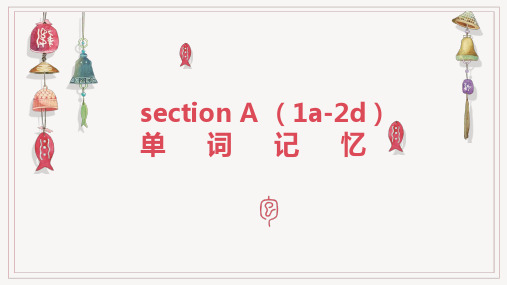
谢谢您的观看
Thank you for watching
拼读法:英[spiːk] 美[spiːk]
Part 8
8.Join v.参加;加入
拆分:j(鸡的首拼)+o(鸡蛋的象形)+in (里面) 记忆:鸡拿着蛋在里面加入聚会
拼读法:英[dʒɔɪn] 美[dʒɔɪ
拆分:c(月亮的象形)+lub(路的拼音和边 的首拼) 记忆方法: 月亮看到路边有俱乐部。
拼读法:英[sɪŋ] 美[sɪŋ]
Part 3
3.Swim v&n. 游泳
拆分:sw(丝袜的缩拼)+i(蜡烛的谐音) +m(汉堡包) 记忆:去游泳的人穿着丝袜,还带着蜡烛 和汉堡
拼读法:英[swɪm] 美[swɪm]
Part 4
4.Draw v.画画
拆分:dr(敌人的缩拼)+a(一)+w(乌鸦 的首拼) 记忆:敌人在画一只乌鸦
拼读法:英[klʌb] 美[klʌb]
Part 10
10.Tell v.讲述;告诉
拆分:te(特工的拼音)+ll(榴莲的拼音) 记忆方法:特工讲述如何吃榴莲
拼读法:英[tel] 美[tel]
Part 11
11.Story n.故事
拆分:st(社团的缩拼)+o(鸡蛋的象形) +ry(日月的缩拼) 记忆方法:社团的人拿着鸡蛋讲日月的故事
section A (1a-2d) 单词记忆
Part 1
1.Guitar n.吉他
拆分法:gui(龟的拼音)+ta(踏的拼音) +r(小草象形) 记忆:乌龟边弹吉他边踏草。
人教版七年级下册英语Unit 1 Section A (1a-2d)
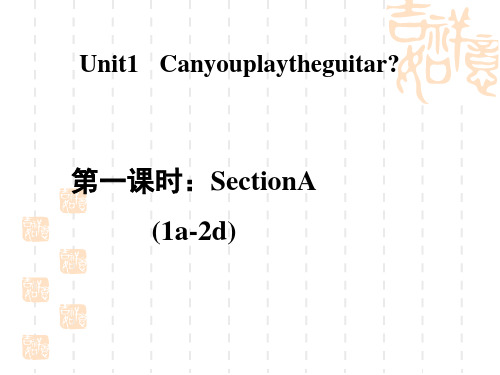
2a
Listentothesetwoconversationsandcircletheclubsyouh ear.
a. Englishclub b. artclub c. musicclub d. chessclub e. swimmingclub
—Whatclubdoyouwanttojoin? 7 —Iwanttojointhechessclub.
e.g. MayIspeaktoLucy? 我可以和露西通话吗?
① 辨析:speak, say, talk与tell
tellsb.
sth.= tellsth.
vt. 说(某种
①speak+语言 说某种语
tsopsbe.a 告某诉人k
语言)vi. 说 话
言 ②speak to sb. 跟某人说
某事
话
________.
English
3. MEanryglliiksehsmusic. Shecan_______and_______. Boblikes
music, too. Theywanttojointhe________club.
sing
dance
music
2b
Conversation 1 David: What club do you want to join, Lisa? Lisa: I want to join the chess club. David: Can you play chess? Lisa: No, I can’t. What about you, John? John: I can.
a2
f3
—Iwanttojointheartclub.
4
—Canyoudraw?
人教版英语九年级全一册-Unit 1 Section A (1a~2d)课件

Warming-up Pre-listening While-listening Post-listening
Summary
Listen and fill
Some boys and girls are talking about the best ways to learn English in the English club. No one learns English by _w__at_c_h_in_g__v_id_e_o_s__ because it’s too hard to understand spoken English. A girl thinks keeping a diary in English helps. Another girl learns by _s_tu_d_y_i_n_g_w__it_h_a__g_ro_u_p__ a lot. And she also studies by _h_a_v_in_g__c_o_n_v_e_rs_a_ti_o_n_s_ with friends to improve her speaking skills. One of the boys thinks it helps to practice pronunciation by _r_ea_d_i_n_g_a_l_o_u_d_. They also thinks learns by _l_o_o_k_in_g__u_p_n_e_w__w__o_rd_s__ in a dictionary is a great idea.
Summary
Make a conversation
A: How do you study for a test? B: I study by working with a group. A: Do you think we study for tests? B: …
七年级上册英语授课课件 Unit 1 Section A (1a-2d)

1
A:Goodmorning! I'mCindy. B:Hello,Cindy! I'mDale. A:Nicetomeetyou!
3
A:Hi. Myname'sGina. B:I'mJenny.
Nicetomeetyou! A:Nicetomeet you,too.
1b
Conversation1 Cindy:Goodmorning! I’mCindy. Dale:Hello, Cindy! I’mDac.
Tom:Andwhat’shername?
Alice:Nicetomeetyou.
Grace:Hername’sAlice.
Conversation3 Bob:Excuseme, areyouEric? Eric:Yes, Iam. AreyouMike? Bob:No, I’mnot. I’mBob. Nicetomeetyou. Eric:Nicetomeetyou, too.
考点6 too/tuː/adv. 也;又;太
too 用作副词,意为“也”,常用于肯定句句末,常用逗 号与前边内容隔开。This is a cup, too. 这也是一个杯子。
too
too 用作副词,还可意为“太”。The hat is too big. 这帽 子太大了。
too 用作副词,用于人称代词之后,表示“某人 也……”。—I like English. 我喜欢英语。—Me, too./Me too. 我也喜欢。
考向 his用作形容词性物主代词,意为“他的”,后 加名词(短语)。 e.g. Thisishisruler. 这是他的尺子。
典例 Hesold (卖) ______C____house. [重庆B改编] A. heB. himC. his
Unit1SectionA(1a2d)课件人教版英语九年级全一册

续表
Period 1 Section A(1a-2d)
重难点梳理
1.—How do you study for a test? —I study by working with a group.(P1,1c) ——你怎样准备考试的? ——我通过小组学习的方式来备考。
知识探究 by doing sth.此短语中by是_介___词,意思为“__通__过__做__…__…__”等,其
Jack and his friend Annie are discussing English reading. Jack has
to finish reading a book and 1 .a report next Monday. And he
tells her that he's a 2 .reader. But Annie doesn't think it's so
Period 1 Section A(1a-2d)
重难点梳理
即学即练 他太小而不能上学。 He is _t_o_o_ young _t_o_ go to school. He is __so__ young __th_a_t_ he can't go to school. He isn't _o_l_d__e_n_o_u_g_h_ to go to school. 4.The more you read,the faster you'll be.(P2,2d) 你读书越多,你 阅读的速度就会越快。 知识探究 the+比较级,the+比较级,意思为“__越__…__…__越__…__…__”。而 “比较级 +and+比较级”, 意思为“__越__来__越__…__…__”。
新PEP人教版初中七年级上册英语Unit 1 Section A 1a-2d

UNIT 1 SECTION A
例: — What’s your name? 你叫什么名字? — My name is Jack./ I’m Jack. / Jack. 我叫杰克。 — What’s her name? 她叫什么名字? — Her name is Gina. /She’s Gina. /Gina. 她叫吉娜。
UNIT 1 SECTION A
Language points
My name’s...和I’m...都是自我介绍时需要用到的句 型,意为“我的名字叫……”或“我是(叫)……” 后者比前者更随意一些。其中name’s是name is的缩写 形式,I’ m是I am的缩写形式。
UNIT 1 SECTION A
的同义句为:“Nice to see you.”或“Glad to see you.”例如:
—I’m Gina. Nice to meet you! 我叫吉娜。见到你很高兴。 —Nice to meet you, too. 见到你我也很高兴。
UNIT 1 SECTION A
(武汉中考) —Hi. My name is Tim. It’s my first time to be here.
UNIT 1 SECTION A
Warming-up
Do you remember how to greet people?
你还记得如何问候吗?
Hi!
(表示问候)嗨
Hello!
(表示问候)喂
Good morning! 早上好!
UNIT 1 SECTION A
Good afternoon! 下午好!
UNIT 1 SECTION A
2a Listen to the conversations and number the pictures
英语人教新目标八年级上册人教英语八上Unit 1 Section A 1a—2d

I visited the museums.
Where did you go on vacation?
New York City
I went to New I went to the Great Wall. York City.
I visited my uncle.
1.stayed at home
Kevin, where did
you go on
I ...
vacation?
Oh, really? Did you go Yes, I ... with anyone?
2d Read the conversation and match
the people with the right place.
mountains _c_
6. went to the beach _a_
7. visited museums _e__
Listen and number the
1b
people in the picture (1-5).
1. Tina 2. Xiang Hua 3. Sally 4. Bob 5. Tom
√
Kevin play volleyLeabharlann all?√swim?
√
meet anyone interesting?
√
Julie do anything interesting?
√
study for tests? go out with anyone?
√ √
Central park 中央公园位于美国纽约中心的曼哈顿地
I went to Beijing
for vacation.
I went to summer camp.
- 1、下载文档前请自行甄别文档内容的完整性,平台不提供额外的编辑、内容补充、找答案等附加服务。
- 2、"仅部分预览"的文档,不可在线预览部分如存在完整性等问题,可反馈申请退款(可完整预览的文档不适用该条件!)。
- 3、如文档侵犯您的权益,请联系客服反馈,我们会尽快为您处理(人工客服工作时间:9:00-18:30)。
Unit1 Period1教案
Section A (1a-2d)
教学过程
Warming-up and revision
找出三名外貌差异较大的学生来做比较,一个胖而高大的男生(a fat and tall boy),一个瘦而较矮的男生(a thin and short boy),一个中等身材(of medium height)。
然后用这两名学生为例教heavy, tall, thin, short引出句型:
1. What do you look like? He’s really tall. He has long straight hair.
2. What does she look like? Sh e’s of medium/build.
…
Presentation (Section A 1a)
1. Match the words with the people in the picture. (1a)
2. 引导学生熟悉有关描述人的外貌特征的词
Practice (Section A 1c)
1. Read the conversation and recite it.
2. Practice like the conversation according to some pictures.
Listening (1b, 2a & 2b)
1. Look at the picture of 1a, listen and fill the blanks in the picture. (1b)
Listen carefully and fill in the blanks and find Amy’s friend? We will listen twice.The first time, just listen.The second time,listen and fill in the blanks.And say the look of Amy’s friend.( He's really tall.And he has curly hair.)
2. Listen and answer the questions. (2a)
3. Listen again and fill in the chart. (2b)
4. Listen a third time to understand the key words.
Practice (2c)
1. Student A looks at the chart in 2b. Student B asks Student A questions about one of the people and then draws a picture of the person quickly.
2. Act the dialogue.
Role-play the conversation. (2d)
1. Read the conversation to answer the questions:
(1)When are they meeting?
(2)Where are they meeting?
(3)What does David look like?
(4) Is he tall or short?
2. Read the conversation.
3.Role-play the conversation.
4. Explanation:
(1) may be
(2) a little
Homework
1. 熟记本节课所学单词。
2.Describe your friends in the class and draw a picture of them.。
